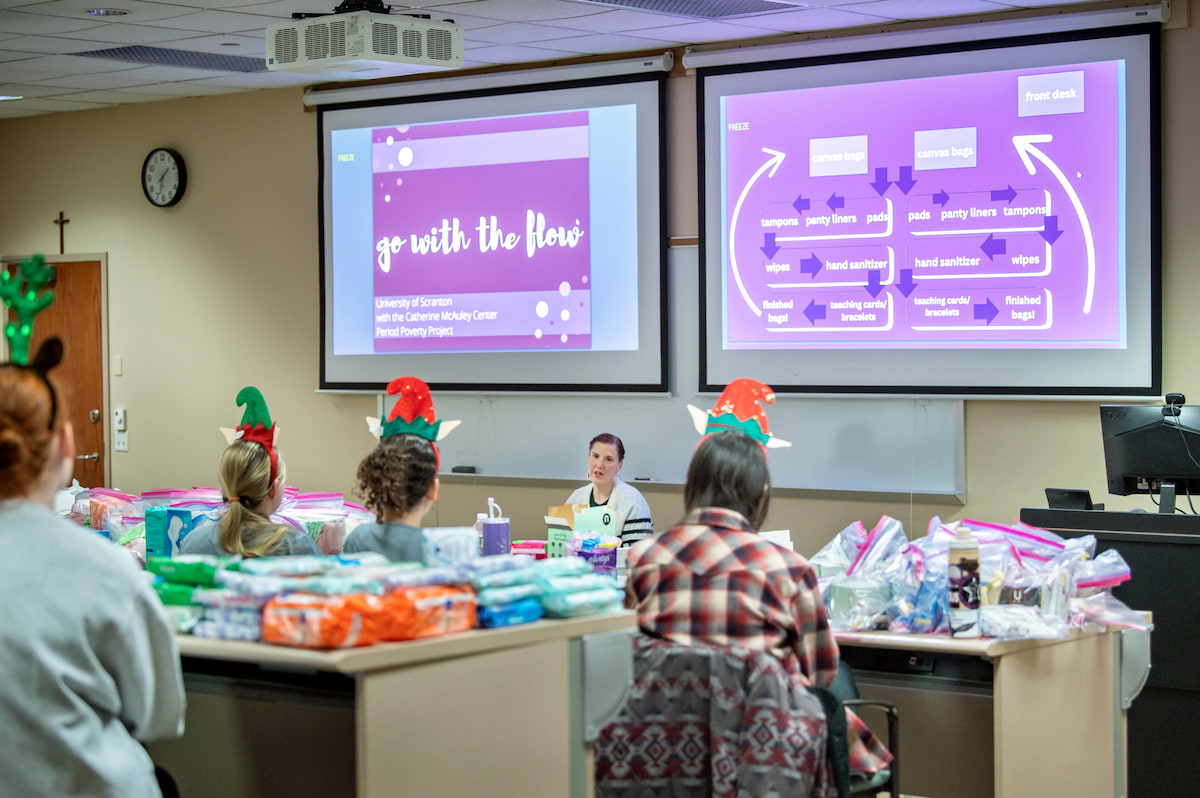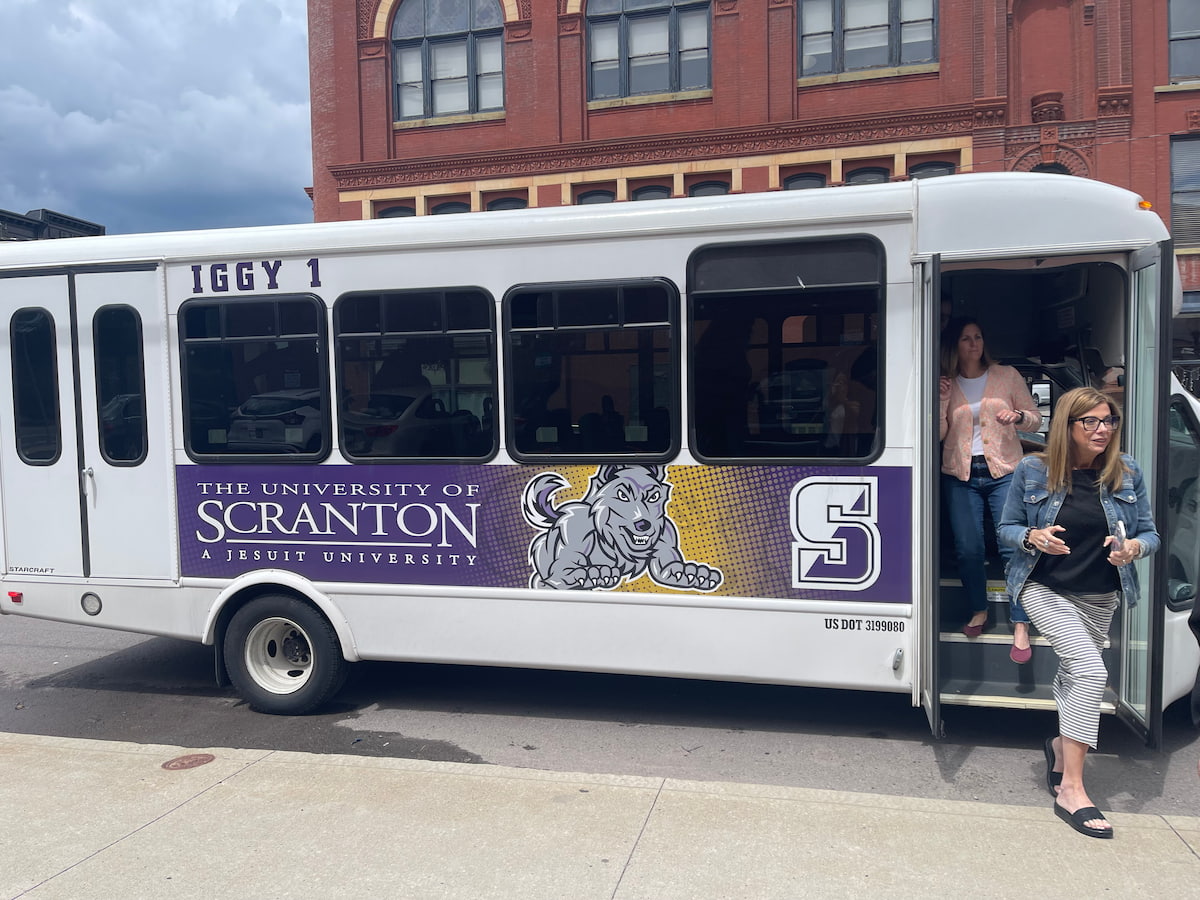During a presentation to Professional Nursing students, Daysi Carreto ’14, assistant director of community and civic engagement at Scranton, highlighted the Catherine McCauley Center’s “Period Project,” which provides menstrual products to clients, many of whom are experiencing homelessness. The presentation opened the eyes of many students to the challenges of menstrual hygiene product access due to poverty. Inspired by this, they, under the guidance of their instructor, Dona Rinaldi Carpenter, Ed.D., professor of nursing, began to collaborate with the Catherine McCauley Center on a Community-Based Learning (CBL) project.
Across campus and throughout Scranton, faculty and students are partnering with community organizations to enrich the learning environment of future alumni while facilitating positive change in the community. “Community-Based Learning is a great opportunity for students to integrate what they are learning in the classroom into a real-world setting,” said Carreto.
Dr. Carpenter couldn’t agree more. “It (CBL) opens the students’ eyes and gives them a real sense of what people need in the community.”
What started in the spring 2024 semester with five students gathering enough donations to make 30 gift bags of period products grew exponentially by the fall semester, with 36 students collecting enough donations to put together 100 canvas bags filled with period and self-care products, educational cards and bracelets made by the students to donate to those in need.
For Mary-Pat Ward, development director of the Catherine McCauley Center and Friends of the Poor, the partnership with Dr. Carpenter and her students struck a chord between two organizations that are community-minded at their core.
Ward, once a program participant at the McCauley Center, has completed the nonprofit leadership certificate program in the University’s Kania School of Management, and has lived experiences with both entities. At the University, she sees an organization that makes Community-Based Learning far more than “a bullet point requirement.” It sits within the classroom as part of a “package of learning” that nurtures “the idea of community-mindedness.
Web Exclusive

Student Reflections from Nursing CBL Class
Students in Dr. Dona Carpenter’s Foundations of Professional Nursing course wrote reflections about the “Period Project” Community-Based Learning project conducted with the Catherine McCauley Center.
Read Article
The Why Behind CBL’s ‘Important Work’
While Community-Based Learning isn’t new at Scranton, it has grown substantially since a dedicated CBL Office was first launched in 2017. Debra Fetherman, Ph.D., professor and chair of Health and Human Performance and Community-Based Learning faculty coordinator, was part of the original group that sought ways to grow service learning as part of the University’s Strategic Planning process. What sets Community-Based Learning apart from other types of service is “how it is grounded in Ignatian pedagogy and puts that into action,” said Dr. Fetherman. Another key differentiator is how reflection is infused into CBL learning so that students can better understand the service as part of their academic experience and personal growth.
The combination of Ignatian-inspired pedagogy and reflection results in “transformative learning,” according to Dr. Fetherman. “It gives meaning behind why we are doing this important work. It (CBL) helps to form the person … it’s the kind of learning that is very deliberate."

A Feeling That We’re in this Together’
Today, the CBL Office is supported by a CBL Board comprised of faculty, staff and administrators. In 2023-2024, 87 community-based learning classes were conducted. A total of 2,362 students engaged in academic community-based learning, either through these classes or in activities related to their academic program, for a total of 31,373 hours. This includes 2,129 students from the Leahy College of Health Sciences, which has a longstanding requirement of requiring students to complete 80 service hours for graduation.
Julie Schumacher Cohen, assistant vice president of community engagement and government affairs and CBL Board Chair, said the breadth and depth of engagement is a testament to the ways in which CBL matches the skills and resources of faculty and students with community partners.
“It hits the sweet spot of how our educational mission connects with the community,” said Schumacher Cohen.
Being small – or at least smaller – has its advantages, she added. “Scranton is a relatively small city, and we are a small office that is very connected to the community,” she said. “There’s a feeling that we’re in this together.”
Schumacher Cohen was instrumental in connecting the economic development non-profit Scranton Tomorrow with Aram R. Balagyozyan, Ph.D., associate professor of economics, to update the map of businesses in downtown. Students in Dr. Balagyozyan’s Principles of Macroeconomics class surveyed the region to identify downtown businesses and to group them by categories. They created a spreadsheet with the updated data that was then turned into a map used to promote the downtown Scranton businesses to visitors and students.
In addition to the benefit of creating an updated map, the initiative shows students in real time “how macroeconomics works from the ground up,” said Dr. Balagyozyan.
In surveying businesses, students often developed connections with the business owners. Dr. Balagyozyan conducted an informal survey of his own that revealed positive outcomes of this CBL initiative. Before engaging with downtown businesses for the map project, students had somewhat pessimistic opinions about the downtown. After meeting with business owners and learning more about their businesses, students had much more optimistic attitudes.
Faculty Fellows Integrate an Ignatian Mindset
Beyond the coursework and student engagement, CBL has grown appreciably in other ways. The CBL Faculty Fellows Program supports faculty eager to fully integrate CBL as an intentional pedagogical strategy and community engagement activity into their coursework, either by revamping an existing course or developing a new course or project. Including participants in the third cohort of Faculty Fellows, 13 educators have completed an academic year with the CBL program.
One such faculty member is Brian J. Snee, Ph.D., ‘93, associate professor of communication and media, who is also a CBL Board member.
Community-Based Learning assignments are central to most of Dr. Snee’s courses. “I don’t want my students completing assignments for an audience of one (me). I want them to be responsible for and accountable to the needs of a real-world client,” he said.
“I try to select local non-profit organizations as my CBL clients, thereby subtly adding a strong Ignatian element to skill-based courses. The result is that my students produce good work that does good in the world,” Dr. Snee said. Organizational clients have included Neighborworks Northeastern PA, Outreach, Lackawanna Heritage Valley, Valley in Motion and Keystone Mission.
The Faculty Fellows Program includes workshops, reflection meetings and stipend support, all of which have helped to “build a great group of faculty who support the CBL program,” according to Dr. Fetherman. Looking back over the program’s growth, Dr. Fetherman said, “the ways in which CBL is so directly tied to the mission of the University is more evident.”
Web Exclusive

Office of Community-Based Learning Announces Faculty Fellows
The Community-Based Learning (CBL) Faculty Fellows program seeks to expand, strengthen and institutionalize CBL at the University as a demonstration of its commitment to the common good.
Read Article
New Faces, Voices Present Growth Opportunities
New for the spring 2025 semester will be the first cohort of Student Fellows. Members of the CBL Board and staff selected five students through a rigorous application process for a semester-long fellowship. In reviewing the student proposals, Carreto said she was “in awe” of what the students had in mind for projects. Selecting just five students from the applicants was no easy task.
“We were looking for students interested in pursuing CBL projects that highlighted their interests and would meet community-defined needs,” said Carreto.
The selected students will be working alongside a faculty mentor and will be connected to a local organization, with the support of the CBL Office.
The CBL Talks, an annual series that originated in spring 2021 during the COVID-19 pandemic, continued in spring 2024 with three presentations featuring community partners representing some of the most pressing needs of the local population. The hourlong talks, open to the entire University, discussed health disparities in Lackawanna County, immigration, and homelessness and poverty in our region. Three are hosted each spring.
Looking ahead, Community-Based Learning is poised for future growth, not just in numbers but in the way that it speaks to the true spirit of the Jesuit educational experience at Scranton.
“It’s an ongoing dialogue,” said Schumacher Cohen. “We want to keep the conversation going as the needs of the community continue to evolve.”
Web Exclusive

Community-Based Learning Student Fellows Aim to Expand Program's Reach
Meet the first cohort of the University's pilot CBL Student Fellows Program.
Read Article





